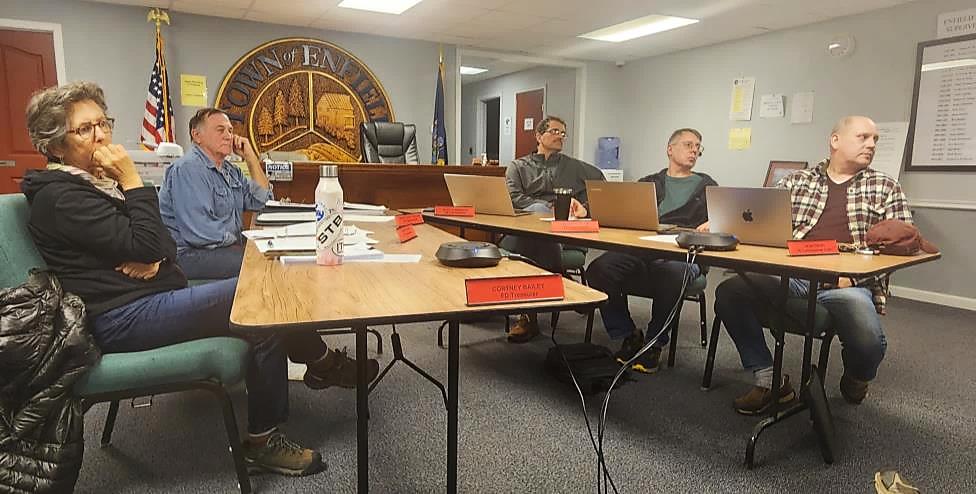
Reporting and Analysis by Robert Lynch; October 24, 2023
Jim Mathews had it right: “We’re trying to build the airplane as we fly it,” the Chair of Enfield’s newly-formed Board of Fire Commissioners advised his fellow board members Monday. And quite clearly, when the Commissioners “flew” their proposed 2024 Budget into a Public Hearing four days earlier with town residents on board, a wing and a propeller still lay crated in the hangar.
Monday night, realizing they’d grossly underestimated expenses, including bonding costs and legal bills, Fire Commissioners made a significant upward adjustment in the budget that had been presented at the Public Hearing the prior Thursday, when the bottom-line of next year’s budget had been predicted to stand similar to that for 2023.
Instead, the earlier-offered $389,736 tentative spending plan had grown to one totaling $483,691. Projected spending had risen 24.1 per cent in just four days. It’s apparently legal to make adjustments like that. But in some Enfield circles, it may not sit well.
The Fire Commissioners won’t finalize or adopt their 2024 Budget until their next meeting, November second.
“If we bump this up 25 per cent is this still valid?” a skeptical Commissioner Marcus Gingerich asked Zach Longstreth, the evening’s stand-in legal counsel, Gingerich questioning the legal limits of a post-hearing budget increase.
“Yes,” said Longstreth, “you didn’t bind yourself to this number,” the attorney said, referencing the earlier total.
“It’s affecting the reality we encountered, and we’re doing it in public,” Mathews explained. He sought to calm Gingerich’s jitters.
Yes, Commissioners amended their budget at a public meeting, but not at or before the Public Hearing. There’s a difference. Yet Mathews and other Commissioners seemed oblivious to that distinction.
What principally drove Monday’s budget revision was the realization that the Commissioners had vastly underestimated the annual cost of their bonding two new fire trucks. That bonding option will go before Enfield’s voters for approval in a quickly-called referendum set for Halloween.
The tentative budget presented at the October 19th Hearing had estimated annual loan payments of $65,000. Amended calculations, acknowledged by Commissioners Monday, elevate that projected yearly cost to nearly $100,000, assuming the bonds are purchased immediately; or to about $89,000, should the Fire District delay long-term financing and utilize short-term notes for a year or two. The larger number would raise the bonding expense by more than 50 per cent from the figure cited at the hearing.

“I feel like we’re guessing. I don’t like feeling like we’re guessing,” Chairman Mathews warned his colleagues Monday, uncomfortable that numbers keep changing as the fog of uncertainty lifts little-by-little, meeting-by-meeting. “We could adopt a number, and it could be wrong,” he cautioned.
Yet the Commissioners’ Chair made the point Monday to walk-back a worst-case scenario he’d first advanced to some surprise at the Public Hearing. Mathews indicated that should voters reject the Fire District’s purchases and bonding at the October 31st referendum, it’s unlikely Commissioners would give back to its manufacturer or to the bank the new $825,000 pumper engine the Enfield Volunteer Fire Company (EVFC) purchased earlier this year.
“We have to have the pumper,” Mathews emphatically stated Monday. “First, it’s on the property,” he said. “And secondly, we need it for public safety.”
With a revised budget total of $483,691, Mathews projected that next year’s Fire Tax for Enfield would rise from $1.72 per thousand to $1.94.
“The difference is a lot of money,” Mathews conceded, comparing the revised budget total to the proposal aired at the Public Hearing. “But the difference in tax rate is not a lot of money.” The Chairman projected the revised budget would cost the typical Enfield taxpayer less than a dollar-a-day for fire protection.
But all through Monday’s long meeting, Fire Commissioners made one blind, dangerous assumption. They presumed voters will, indeed, consent to bond $1.05 Million toward fire truck purchases in next Tuesday’s referendum. The budget figures hold only if the referendum passes. If it fails, the $89-100,000 debt service line could jump to $185,000, as the Fire District (assuming it still kept the trucks) must fall back onto traditional bank financing.
Commissioners stood so confident Monday of an affirmative vote that Robyn Wishna almost moved to finalize the budget on the spot. Optimism serves its purpose to a point. But the electorate—particularly Enfield’s electorate—does not welcome their votes being taken for granted. Most of the Fire Commissioners are political novices. Their naiveté stood on display that evening.
Yet should the bond measure pass, Fire Commissioners might bide their time before marketing the actual bonds. The Halloween referendum would affect two trucks; namely the newly-bought (now) $830,000 pumper, and a less-expensive tanker, one purchased in 2020. The tanker has $220,000 yet unpaid. To shave financing costs a bit, and perhaps also to enable interest rates to cool, Commissioners Monday discussed potentially spreading out truck debt with year-by-year bond anticipation notes. By initially relying on the notes, they’d also forestall incurring a one-time, $11,000 bonding legal fee, the difference between the $89,000 debt payment and one totaling nearly $100 Grand, as previously stated.
But what’s also contributed to the Enfield Fire Budget’s last-minute increase is the added expense that Syracuse-based attorney Brad Pinsky has quoted for his services. Based on Pinsky’s estimates, Commissioners Monday hiked their budget line for legal fees from $15,000 to $40,000, a more than 160 per cent increase.
“I wish we didn’t have $40,000 in extra legal fees,’ Wishna remarked, the Commissioner apparently combining both Pinsky’s charges for what he’d get for his normal work and what he’d also earn as bonding counsel.
For this, the sixth straight meeting, Brad Pinsky, himself, was physically absent from the Fire Commissioners’ session Monday. He sent Longstreth, his junior associate, instead.

And what Pinsky’s office plopped onto Commissioners’ desks that night fell short of the mark in some members’ opinions. A draft policy manual, quoted by Wishna as 200 pages long, was just mindlessly copied from some other fire district’s document. It cited a district in “Allegheny County” in many places. And even though Enfield’s Commissioners stripped out the most egregious errors before adoption, the work product so disappointed Wishna that she voted against it. Marcus Gingerich abstained.
In plain-spoken remarks that he has subsequently requested not be quoted verbatim [and this writer has revised the story at his request], Enfield Fire Chief Greg Stevenson admonished Commissioners before they accepted Pinsky’s draft manual as a place-holder of sorts, Commissioners pledging to make line-by-line amendments later.
“We’re paying market rate for an attorney,” Chief Stevenson told the Board. The manual “should have been better; it should have been cleaner,” he said.
****
Since taking his seat as a Town Board-appointed Fire Commissioner in August, Enfield Highway Superintendent Barry “Buddy” Rollins has remained relatively quiet, that despite criticism from some in EVFC leadership that Rollins harbors open hostility against the Fire Company. But for a time during the Commissioners’ three-and-a-half-hour marathon meeting Monday, Rollins broke his silence and clashed with EVFC President Dennis Hubbell over Fire Company accounting practices. It began when Rollins zeroed-in on how the EVFC handled $76,000 in proceeds from its recent sale of the 2002 pumper truck that the company offloaded to make way for the new one.
It seems the EVFC had no obligation to turn the truck’s proceeds over to the Fire District’s Commissioners, and it didn’t do so. Instead, it put the money into the EVFC’s “Firemen’s Fund,” utilized for purchases like portable radios and defibrillators. Rollins would have preferred the money had been put toward the new truck’s down payment. And he also questioned why the Fire Company had allegedly not yet accounted for past Town-authorized purchases of protective “turnout gear.”
“You bought an $825,000 engine and (had) no way to pay for it,” Rollins accused Hubbell.
“Well that’s incorrect; that’s totally incorrect,” the Company President responded. “I don’t like that,” Hubbell challenging both the Highway Superintendent’s allegations and his accusatory tone.
“Where’s the money in the budget?” Rollins then asked.
“The Town Board agreed—they signed documents,” Hubbell answered, “to back that loan, to back that low interest rate with tax-free money,” (The Town Board did, in fact, approve such financing in February.)
“That’s not true, either,” Rollins fired back. “You twisted that all around; the Town Board deal.” The Superintendent continued, “When you stand there and say you paid $80,000 for two SUV’s, instead of buying turnout gear for your crew, then that’s untrue.” Rollins harkened back to the Town Board’s last year’s budget debate when the EVFC’s cash purchase of a command vehicle clouded the company’s funding request for more protective clothing.
“He’s accusing us of lying,” one Fire Company supporter stood up and shouted from the gallery.
Mathews urged everyone to “take a step back,” the Chairman assuring that “everyone is acting in good faith,” and no one’s doing anything “nefarious.”
Yet, a 24 per cent budget increase, especially one added-in only post-op to a hearing, could lead some to question the Board of Fire Commissioners’ own credibility, let alone its competence. Mind you, it could have been worse. Commissioners rejected attorney Pinsky’s recommendation that they tack an extra ten per cent onto everything they had initially budgeted last week. A ten percent increase could have blown the proposed Fire Budget to well over a Half-Million Dollars, and pushed it to within $50,000 of a Statutory Spending Limit that Enfield voters had raised only last month. It’s a spending ceiling supposedly good for the next five years.
“That’s a big jump. We’re going to increase the budget by 25 per cent,” Gingerich observed as the budget discussion headed toward its close that night.
“It really makes me sad that everyone hasn’t been able to do better,” Commissioner Geoff Hollister responded. “And that has to change.”
###

